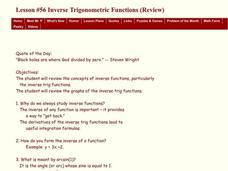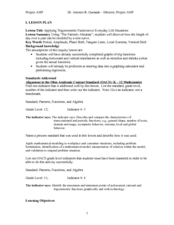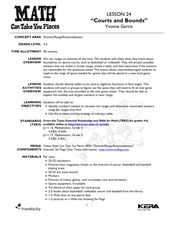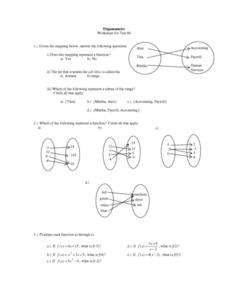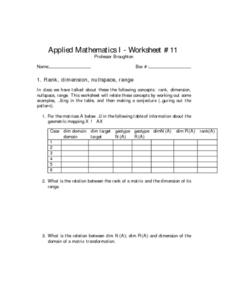Curated OER
Algebra 1: Unit 5 Review
In this problem solving learning exercise, 6th graders determine if 4 functions are exponential growth or decay, sketch 4 graphs and compare 2 sets of functions. Students write the rule, linear or exponential, for 4 tables.
Curated OER
Inverse Trigonometric Functions (Review)
Students discuss the importance of inverse functions and derivatives. For this calculus lesson, students analyze inverse trig functions by solving for missing angles. They graph the functions and discuss integration by parts.
Curated OER
Applying Trigonometric Functions To Real Life
Learners examine where trigonometry exists outside the classroom. In this trigonometry lesson, students create trigonometric functions to match the data provided and to solve word problems relating to the real world.
Curated OER
Graphs of Functions
In this algebra worksheet, 11th graders graph functions and identify properties of each functions. They find the domain and range, along with the asymptote. There are 4 questions on this worksheet.
Curated OER
Courts and Bounds
Students relate what they know about boundaries on sports courts to explore range of space. In this domain and range lesson, students identify numbers needed to calculate ranges and use the problem solving strategy of making a table.
Curated OER
What's My Function?
Students use input / output tables to help them solve algebraic equations. They use patterns and relations to represent and analyze mathematical situations using algebraic symbols.
Curated OER
Classifying Functions
Eleventh graders sort different types of functions including rational, periodic, exponential, polynomial, quadratic, logarithmic and linear using "function cards." The functions are displayed in multiple representations including...
Curated OER
Function Machine
Second graders decipher a pattern using input and output. In this functions lesson, 2nd graders use input and output numbers to find a pattern involving addition and subtraction. Students use the pattern they discovered to help solve...
Curated OER
Patterns, Relations, and Functions: Lesson 7: Input/ Output Tables
Fourth graders determine how to complete input/output tables. They express rules for input/output or function tables. They complete a worksheet that it is associated with the instructional activity.
EngageNY
Discrete Random Variables
You don't need to be discreet about using the resource on discrete variables. In the fifth installment of a 21-part module, scholars explore random variables and learn to distinguish between discrete and continuous random variables. They...
University of North Texas
Reading Graphs
There is more to the eye than just a graph on paper. The presentation shows three different piecewise graphs and asks an assortment of questions. The resource includes topics such as domain and range, intervals of increasing and...
Virginia Department of Education
Quadratic Modeling
Use a one-stop resource for everything you'd possibly want to teach about quadratic functions and models. Scholars analyze key features of quadratic functions as well as transformations of functions through seven activities....
Radford University
Pizza, Pizza!
Ponder the problem of pizza prices. Pupils use provided information about two different pricing schedules for pizza. They create tables of values and functions to represent the pricing schemes, consider domain restrictions, and identify...
Curated OER
Worksheet 13-Fall 1995
For this math worksheet, students find the domain and range of trigonometric functions. They estimate the limit of a given function. Students identify three statements about one to one functions as true or false. They solve for k in two...
Curated OER
How are we Related?
Students differentiate functions based on their domain and range. In this algebra lesson, students define function, domain, range and relation. They analyze graphs and coordinate pairs for input and output values making up a function.
Curated OER
Introduction To Functions
Learners define a functions and solve problems using functions. In this algebra lesson, students differentiate functions from non-functions. They differentiate between polynomials of higher degrees.
Curated OER
Radical Transformations
High schoolers transform the square root function graphically. In this transforming the square root function graphically lesson, students use their Ti-Nspire to change the a, b, and c values of th square root graph. High...
Curated OER
Vertical and Horizontal Translations
Students analyze function graphs. In this Algebra II/Pre-calculus lesson, students investigate the graph of a function as they determine to which family of functions it belongs, determine the parent function and describe the...
Curated OER
Worksheet 30 Spring 1996
In this math worksheet, students examine the functions for their properties to determine if they are real or not. They also graph them according to their domain and range.
Curated OER
Worksheet 11
In this math worksheet, middle schoolers define a function f(x) by the following rule: for any x ∈ R,set. They also define the domain and range for the functions.
Curated OER
Trigonometry: Worksheet for Test #4
In this trigonometry worksheet, students determine whether given mappings are functions. They evaluate 5 functions for a given x value. Students graph 2 functions. They determine which ordered pairs are solutions to given functions....
Curated OER
PreCalculus Test 3: Angle Measurement
In this angle measurement worksheet, students identify the domain and range of given problems. They determine the amplitude, period and horizontal translation of given functions. This two-page worksheet contains 16 problems.
Curated OER
Power Question #1
In this power question worksheet, students explore functions and their one-to-one correspondence. This one-page worksheet contains four multi-step problems which include proofs.
Curated OER
Linear Algebra
In this linear algebra learning exercise, students solve 3 different sets of problems that include rank, dimension, nullspace and range of linear algebra. They determine the relation between the rank of a matrix and the dimension of its...



